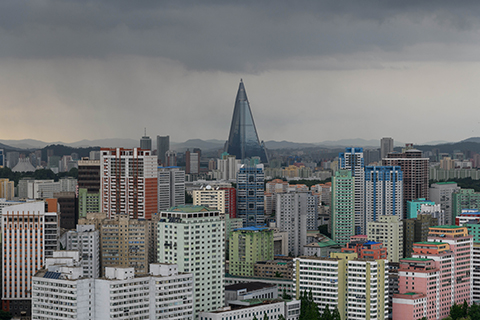 PYONGYANG: A general view shows the Ryugyong hotel and city skyline in Pyongyang. – AFP
PYONGYANG: A general view shows the Ryugyong hotel and city skyline in Pyongyang. – AFPDANDONG: Property speculators in China may be betting that yesterday's US-North Korea summit is poised to unlock riches across the border but Chinese construction machinery dealer Wang Chenglin is far from convinced. Like many business owners in Dandong, through which most of North Korea's trade flows, Wang's hopes have been dashed before.
In particular, he remembers supplying three excavators for the construction of the New Yalu River Bridge, a project that was meant to represent a new era of economic ties but was abandoned after Pyongyang reversed a decision to engage with China. Wang also tells of tough bargaining with North Korean buyers: they sought discounts of as much as 20 percent, and sometimes put up a deposit and then vanished.
'Many flip-flops'
Before United Nations sanctions on the North last August halted his cross-border trade entirely, Wang said he was selling between five and 10 machines a year to North Korean buyers, accounting for roughly 20 percent of his business. He has run his company, Dandong Shuoyu Machinery, for over a decade. North Koreans have started turning up again to look at his machinery since the nation's leader Kim Jong Un visited China in March on his first trip abroad since assuming power.
That is just one of a number of recent signs that cross-border business may be about to pick up. Investors have also been snapping up real estate in this city, which is opposite the Yalu River from North Korea. Yet Wang preaches caution about hopes that the North could open its economy after decades of isolation. "We've experienced many flip-flops ... and I don't entirely believe him," he said of Kim's apparent willingness to end North Korea's isolation by doing a deal with the United States.
Kim is set to meet US President Donald Trump in Singapore on Tuesday at a historic summit to discuss dismantling of the North's nuclear weapons program. Still, if the summit leads to economic opening, Wang said he would look to bring in additional cheaper models that would appeal to North Korean buyers. In that case, he also expected competition from the likes of South Korean and American firms. "Thankfully China's market is big enough," he said.
Abandoned bridge, broken windows
Construction on the 2.2 billion yuan ($344 million) New Yalu River Bridge started in 2012 and symbolized China's efforts to coax its Cold War-era ally into export-oriented reforms. Wang, whose dealership represents local brands such as Jinggong and XCMG Construction Machinery, recalled a grand opening ceremony for the bridge and surrounding planned free trade zones. Kim's powerful uncle, Jang Song Thaek, was in attendance.
That led businesses including Wang's to flock to the Dandong New Zone, and Wang provided three excavators to the North Korean side of the river to help ready the ground for the Chinese-funded project. Things didn't go well. Wang said North Korean border guards even broke the windows on his excavators to steal bread and bottled drinks his workers had left inside when he left the machines on the North Korean riverside at night, forcing him to pay 1,800 yuan per machine for repairs.
Meanwhile, progress on the bridge faltered after Jang, a key liaison between Pyongyang and Beijing, was executed in late 2013 after a North Korean military tribunal found him guilty of treason. The dual-carriageway bridge currently lies unused, while the gates to the free trade zone are deserted and locked. Another equipment distributor, Han Xiaoning, a sales manager for Luyu machinery, said she had done some business with North Korea in the past and was also wary.
"If I relied on North Korea I would starve to death," Han said. Not everyone is so cautious. Fu Hong, a dealer for Lonking machinery, said the brand was popular in North Korea and she was excited about the opportunity if the summit was successful. She said the dealership had taken over another firm that had left the business in January after it was squeezed by the sanctions, and is bullish about prospects across the river. "We feel that this market has the greatest potential." -- Reuters










